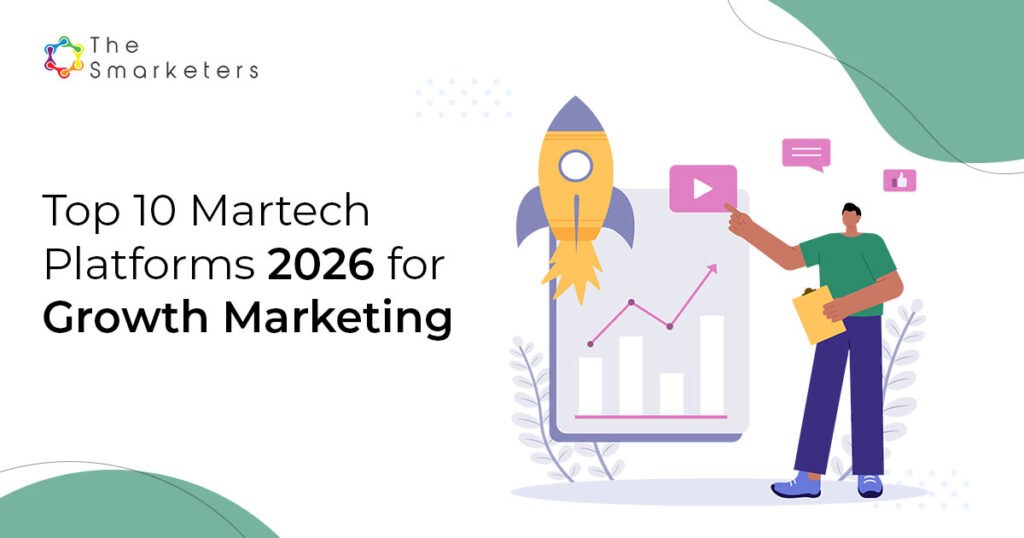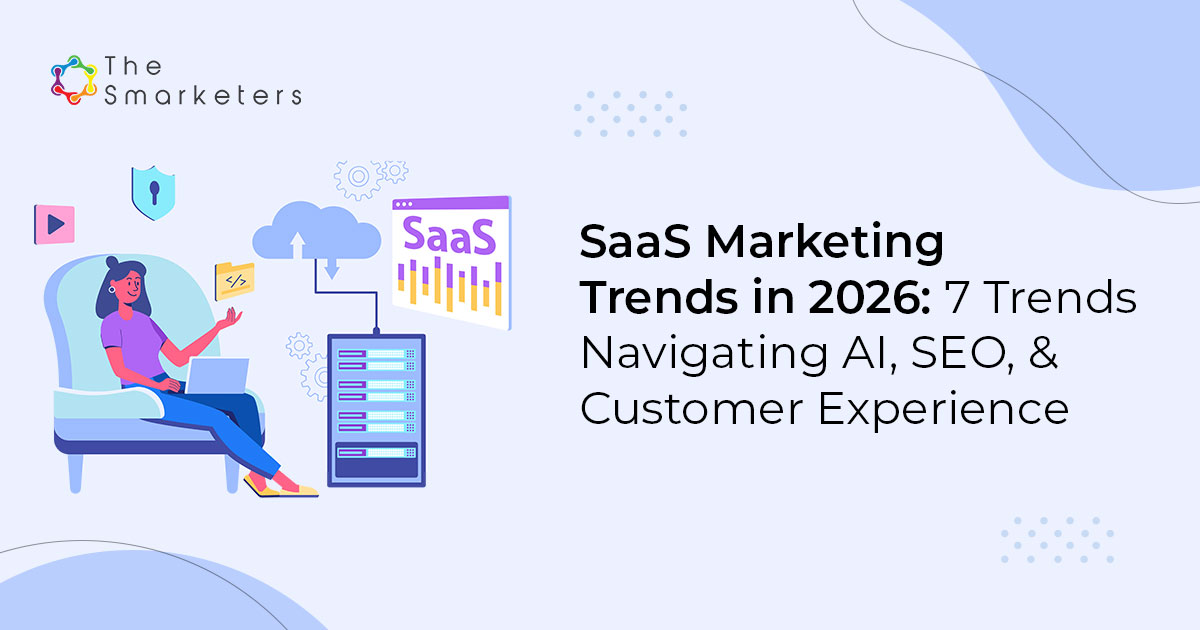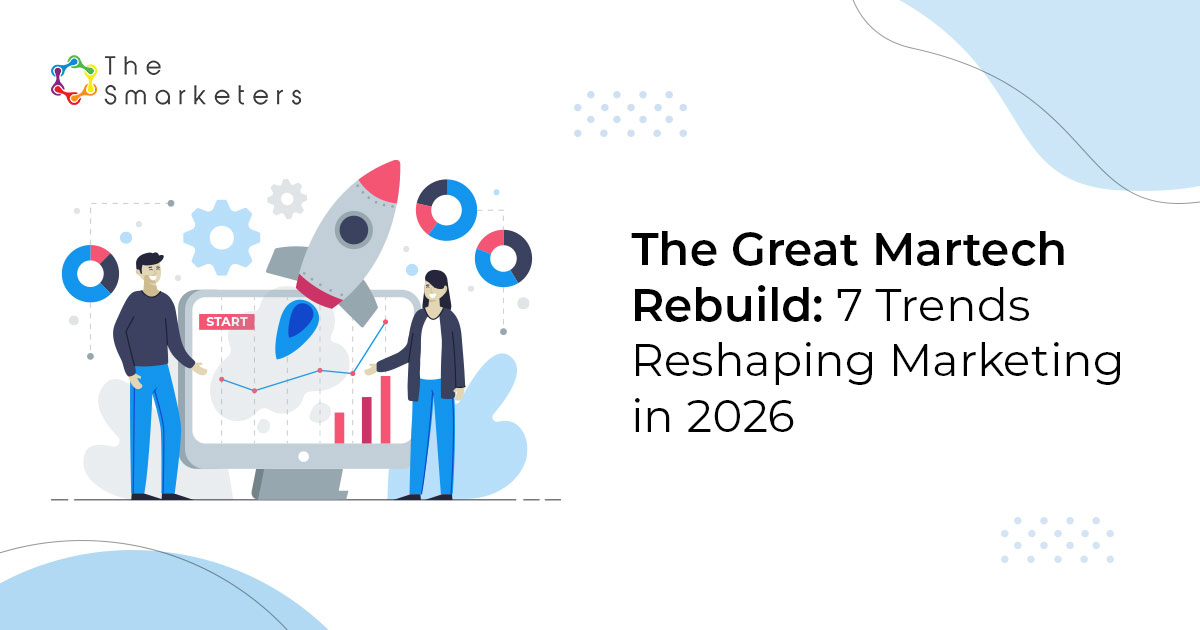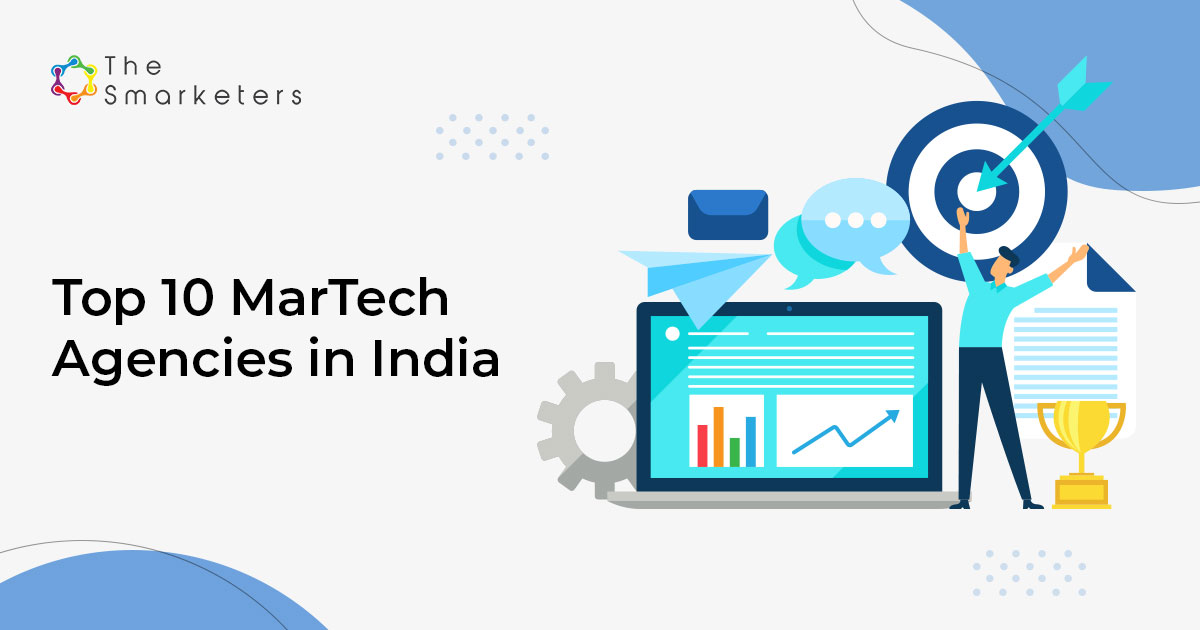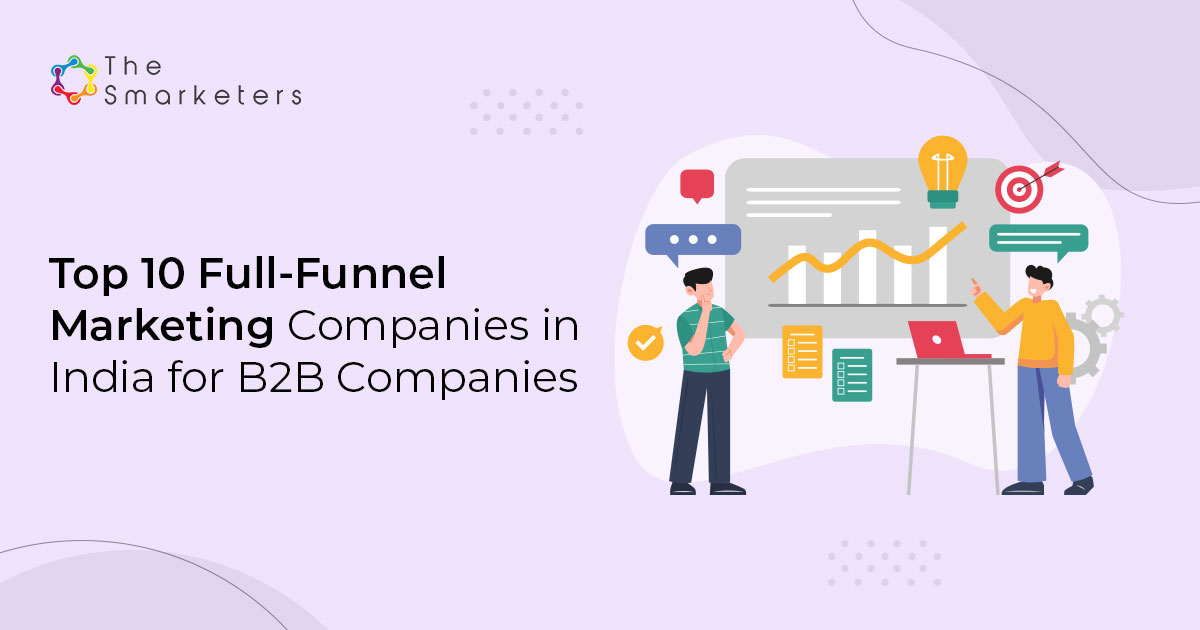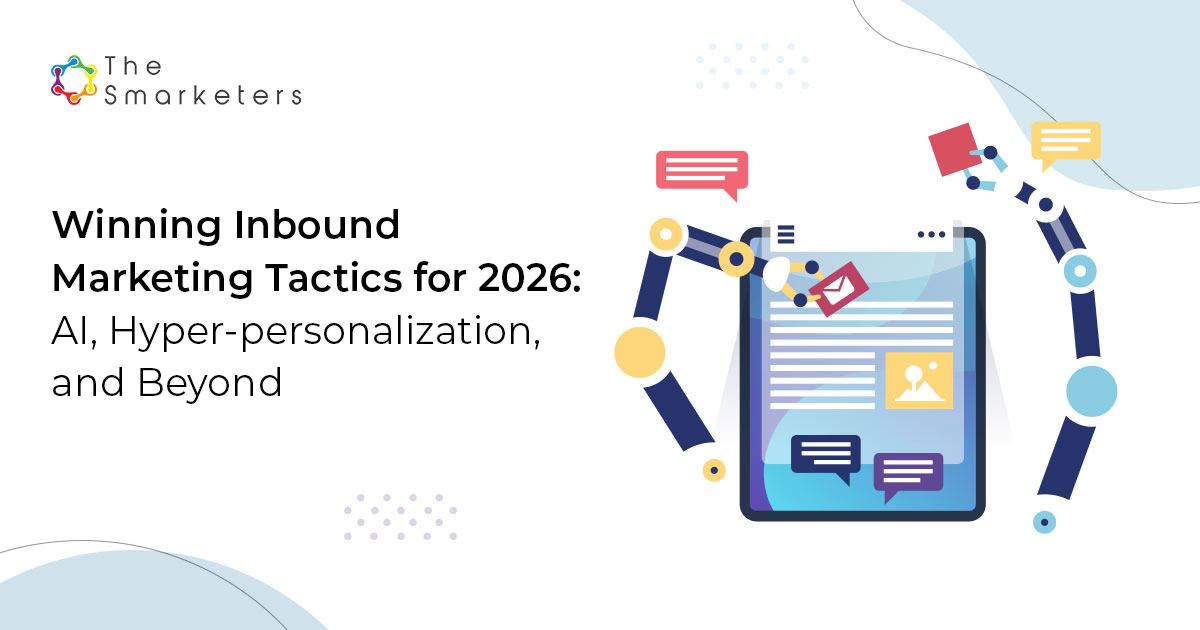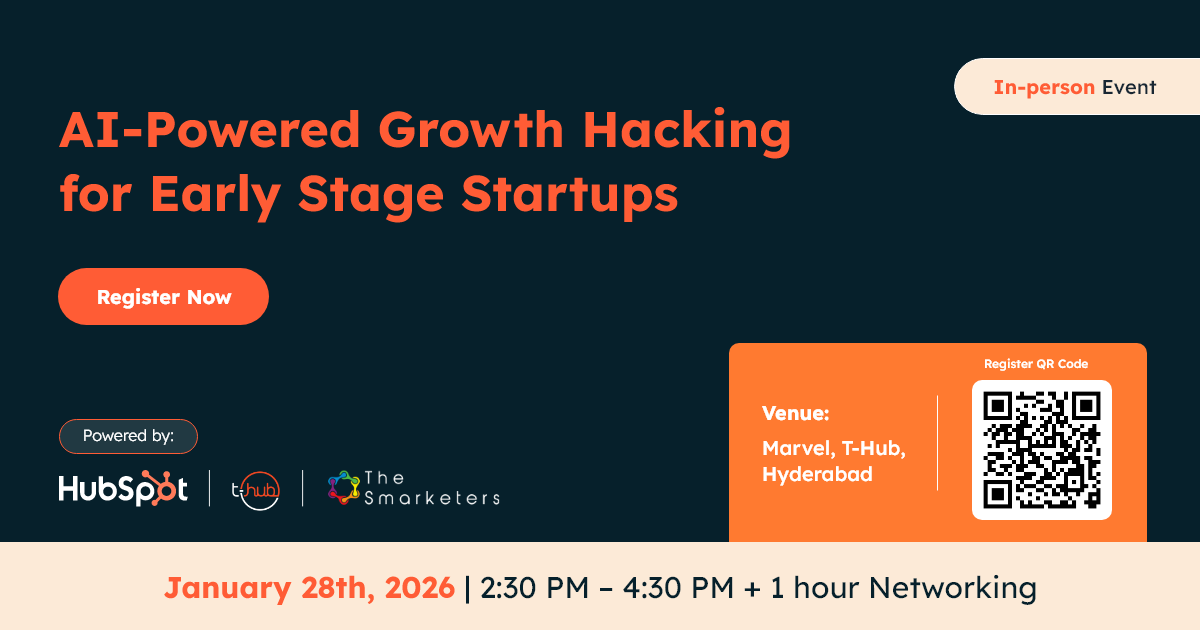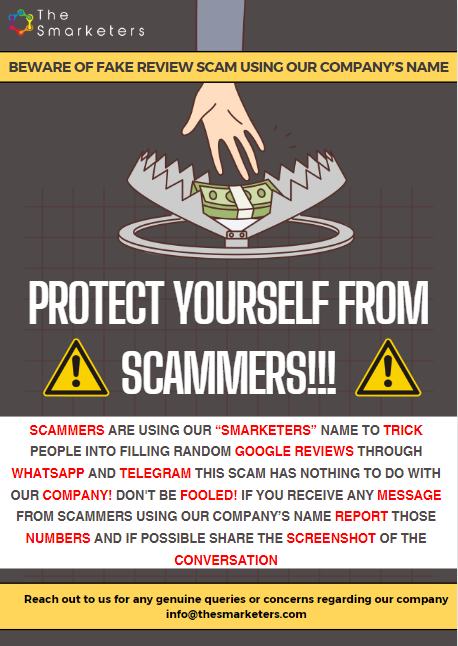Table of Contents
- Types of Martech Tools
- What Are the Top Martech Platforms for 2026?
- 1. Google Analytics 4 – The Foundation of Data-Driven Marketing
- 2. HubSpot – The All-in-One Customer Platform
- 3. Salesforce Marketing Cloud – Enterprise-Grade AI Power
- 4. SEMrush – SEO & Content Marketing Powerhouse
- 5. Mailchimp – Email Marketing Excellence for Every Business
- 6. Marketo Engage (Adobe) – B2B Automation Leader
- 7. Twilio Segment – The Leading Customer Data Platform
- 8. Zapier – Workflow Automation Without Code
- 9. Hootsuite – Social Media Management at Scale
- 10. 6sense – Revenue AI for B2B Excellence
- Complete Comparison of Top 10 Martech Platforms 2026
- How to Choose the Right Martech Stack for Your Business
- Maximizing ROI from Your Martech Investment
- Conclusion
- 2026 Marketing Guide: Integrating AI, MarTech Tools, and Smart Automations
- Guide: How to find the right ABM agency for your organization?
- Data-Driven Growth: Using AI and Analytics to Optimize SaaS GTM Strategies
- Mapping Your Customer Journey with AI – The Results Will Change How You Think About Marketing Forever
- Fully Optimized Website for Aakit Technologies, an SAP Partner
The marketing landscape is undergoing a seismic transformation, and if you’re still relying on outdated tools, you’re leaving growth opportunities on the table. With thousands of martech tools available today and more emerging every year, the ecosystem is more crowded than ever. The recent surge of AI-native products continues to reshape the industry in 2026, as most marketers plan to expand their AI adoption significantly.
In this evolving landscape, choosing the best marketing technology tools or conducting a martech platform comparison has become increasingly complex and time-consuming. The real challenge today isn’t whether to adopt AI marketing tools, but which platforms can deliver the competitive advantage your business needs to scale.
In this comprehensive guide, we'll cut through the noise and reveal the top martech platforms 2026 that actually drive results. Whether you're building your martech stack from scratch or optimizing your existing setup, these platforms remain at the forefront of the future of marketing automation platforms offering B2B martech solutions.
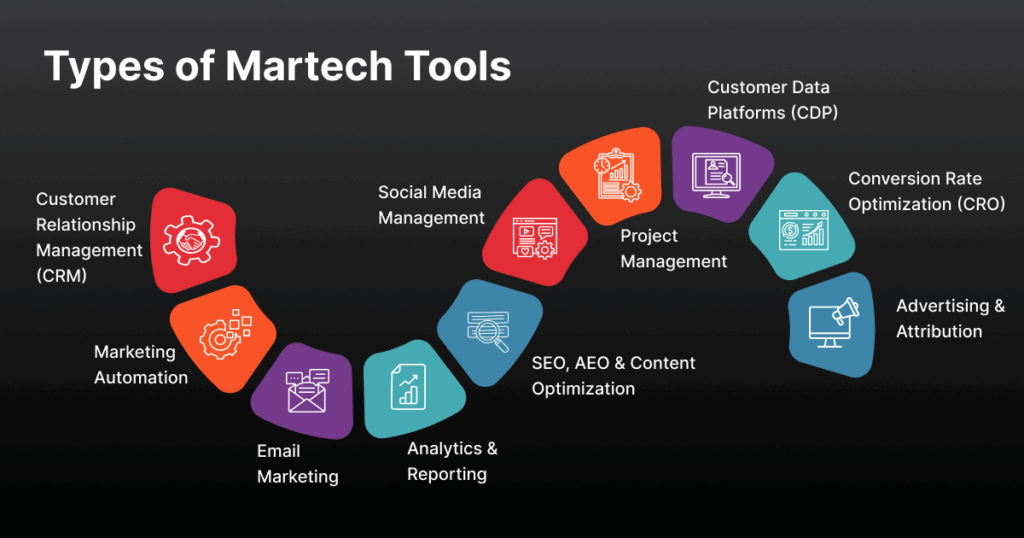
Types of Martech Tools
Martech today is a vast universe with more than 15,384 tools and the number keeps climbing as we head into 2026. With so many options, it’s easy to feel overwhelmed. But understanding the main categories can help you build a well-balanced martech stack that supports every key marketing function. Here’s how these platforms and tools are generally grouped across the marketing ecosystem:
1. Customer Relationship Management (CRM)
The foundation of your martech stack, CRM systems manage customer interactions, track relationships, and centralize customer data. Leading CRM marketing software includes Salesforce, HubSpot CRM, and Microsoft Dynamics. These platforms serve as the single source of truth for customer information across sales and marketing teams.
2. Marketing Automation
Marketing automation platforms streamline repetitive tasks, nurture leads through the funnel, and orchestrate multi-channel campaigns. Tools like HubSpot, Marketo Engage, and Pardot enable sophisticated workflows that respond to customer behavior in real-time, delivering the right message at the right moment.
3. Email Marketing
Despite being one of the oldest digital channels, email marketing remains the highest ROI channel. Platforms like Mailchimp, Constant Contact, and Klaviyo specialize in email campaign creation, segmentation, and marketing personalization tools that drive engagement.
4. Analytics & Reporting
Data-driven decision making requires robust analytics. Google Analytics 4, Adobe Analytics, and Mixpanel track user behavior, campaign performance, and conversion paths. These tools answer critical questions about what's working, what's not, and where to invest resources for maximum impact.
5. SEO, AEO & Content Optimization
Organic visibility continues to drive sustainable growth. Tools like SEMrush, Ahrefs, and Moz still dominate for keyword research, technical SEO, and content optimization. However, in 2026, a new layer ‘Answer Engine Optimization (AEO)’ will continue to reshape strategies. AI-powered platforms now help predict content performance, identify answer-worthy queries, and optimize for AI-driven search engines and voice assistants.
6. Social Media Management
Managing multiple social platforms efficiently requires centralized control. Hootsuite, Sprout Social, and Buffer enable scheduling, monitoring, engagement, and analytics across all major social media marketing tools. These platforms help maintain consistent brand presence while saving significant time.
7. Project Management
Marketing teams need coordination tools to manage campaigns, content calendars, and cross-functional projects. Asana, Monday.com, and Trello keep teams aligned, track deliverables, and ensure nothing falls through the cracks. Integration with other marketing automation platforms creates seamless workflows.
8. Customer Data Platforms (CDP)
Customer data platforms (CDP) unify customer data from multiple sources into single, comprehensive profiles. Twilio Segment, Adobe Experience Platform, and Treasure Data enable true personalized marketing technology by breaking down data silos and powering real-time personalization across channels.
9. Conversion Rate Optimization (CRO)
Optimizing conversion requires understanding user behavior through tools like Optimizely, VWO, and Crazy Egg. These platforms enable A/B testing, heatmap analysis, session recordings, and multivariate testing to continuously improve conversion rates across the customer journey.
10. Advertising & Attribution
Performance marketing platforms like Google Ads, Facebook Ads Manager, and LinkedIn Campaign Manager enable targeted advertising. Multi-touch attribution tools like Bizible and HockeyStack help marketers understand which channels and touchpoints actually drive revenue, not just clicks.
The Need for Seamless Integration
The most successful martech stacks don't simply accumulate tools—they integrate them. Modern platforms increasingly offer native connections, while tools like Zapier bridge gaps between systems. This integration enables the seamless data flow necessary for AI-powered martech to deliver on its promise.
The number of martech tools growing each year, the challenge isn't finding solutions but it's selecting the right combination that works together seamlessly for your specific needs.
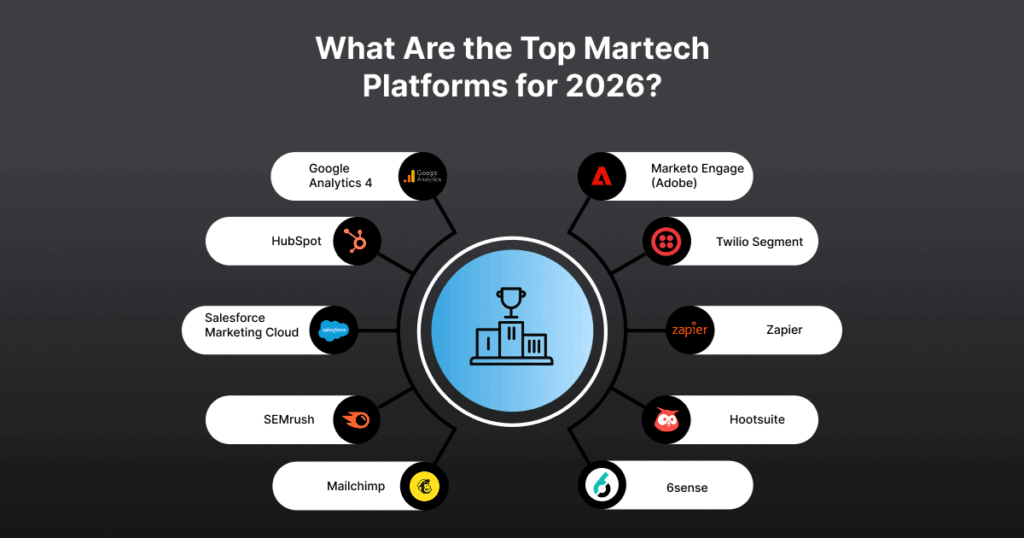
What Are the Top Martech Platforms for 2026?
Choosing the martech platform for 2026 depends on your specific needs. However, remember that the platforms that consistently deliver exceptional ROI share common traits: deep AI-powered marketing platforms capabilities, seamless integration, and proven results in driving growth.
Before choosing the top platforms, it's essential to understand what features should businesses look for in a martech stack. The winning combination includes predictive analytics marketing, customer data platform AI integration, marketing personalization tools, and robust marketing automation AI that actually works.
1. Google Analytics 4 - The Foundation of Data-Driven Marketing
Google Analytics 4 showcases how AI powers modern marketing technology by using machine learning to automatically surface the insights that matter most to your business.
Google Analytics 4 represents the evolution from traditional analytics to AI-powered martech that predicts user behavior. As the most widely deployed analytics platform globally, GA4 is non-negotiable for any serious martech stack.
Key Features:
- Predictive analytics marketing with automatic anomaly detection
- Cross-platform tracking (web, app, offline)
- Event-based measurement architecture
- Privacy-centric data collection (cookieless tracking ready)
- Free BigQuery integration for advanced analysis
- Built-in marketing automation AI for audience creation
AI Capabilities:
GA4's predictive metrics include purchase probability, churn probability, and revenue prediction—powered by Google's industry-leading machine learning. This transforms reactive analytics into proactive strategy.
Why It Excels:
GA4 automatically creates audiences based on predicted behavior, eliminating manual segmentation work and improving targeting accuracy by 40%.
Best For: Every business regardless of size—from startups to Fortune 500 companies needing foundational analytics.
| Category | Details |
|---|---|
| Suitable for 2026? | Yes. GA4 continues to be foundational for measurement and AI-driven predictive metrics. |
| Key features | Event-based model, cross-platform (web+app) tracking, predictive metrics (purchase/churn probability), BigQuery export. |
| AI capabilities | Machine learning for predictive metrics and anomaly detection; automated audience creation. |
| Best for | Any company that needs a single analytics foundation for web + app and wants predictive insights. |
| Risks / limitations | Requires correct event design; privacy/cookieless shifts require careful setup; GA policy/feature changes are frequent. |
Learn More: Google Analytics 4
2. HubSpot - The All-in-One Customer Platform
HubSpot continues to dominate as the most comprehensive marketing automation platform combining CRM, email marketing, and AI-powered tools in one unified ecosystem.
HubSpot with ChatSpot AI delivers unmatched personalization by combining CRM marketing software with conversational AI, enabling marketers to automate complex workflows while maintaining authentic customer relationships.
Key Features:
- Unified CRM marketing tools with native integrations
- AI marketing automation with predictive lead scoring
- Comprehensive marketing personalization tools
- Free CRM tier for startups and growing teams
- 1,500+ app marketplace integrations for martech stack optimization
- Content Assistant powered by GPT for content creation
What Sets It Apart:
HubSpot stands out because it brings marketing, sales, and service together, which makes handoffs cleaner and reporting easier. The platform truly delivers on the promise of unification, making it ideal for teams tired of juggling multiple disconnected tools.
Key Intelligent Features:
ChatSpot AI enables natural language interaction with your CRM data: "Show me all contacts from enterprise accounts who visited our pricing page in the last week" gets instant, actionable results.
Best For: Mid-sized businesses to enterprises looking for an all-in-one B2B martech solutions platform with strong inbound marketing capabilities.
| Category | Details |
|---|---|
| Suitable for 2026? | Yes. HubSpot continues to evolve as an all-in-one with growing AI assistants/agents for SMBs and mid-market. |
| Key features | CRM + marketing automation, content assistant, marketplace integrations, campaign canvas. |
| AI capabilities | Breeze / ChatSpot / AI assistants for content, prospecting, and CRM queries — contextual to your data. |
| Best for | SMBs to mid-market teams wanting unified CRM + marketing with built-in AI helpers. |
| Risks / limitations | Cost scales with usage/features; advanced AI utility depends on good CRM data hygiene. |
Learn More: HubSpot Marketing Hub
3. Salesforce Marketing Cloud - Enterprise-Grade AI Power
Salesforce remains the biggest martech player in the world, globally recognized as the world's most respected and preferred CRM platform. Their evolution into AI-powered martech sets the standard for enterprise solutions.
Intelligent Tools: Einstein & Agentforce
Einstein AI infuses intelligence across the entire Salesforce platform, providing predictive analytics marketing capabilities that help you focus on the hottest leads with unprecedented accuracy.
Agentforce enables users to build and customize autonomous AI agents that can support employees and customers 24/7, representing the future of marketing automation AI.
Core Strengths:
- Customer data platform AI with unified profiles across all touchpoints
- AI-powered marketing platforms with Einstein Analytics
- Comprehensive marketing technology trends 2026 integration
- Multi-cloud ecosystem (Sales, Service, Commerce, Data Cloud)
- Advanced performance marketing platforms capabilities
- Journey Builder for complex customer orchestration
Best For: Large enterprises with complex martech stack requirements and significant budgets for comprehensive B2B martech solutions.
| Category | Details |
|---|---|
| Suitable for 2026? | Yes (enterprise). Salesforce is doubling down on agentic AI (Agentforce) and deeper model partnerships for enterprise use. |
| Key features | Enterprise CRM, Journey Builder, Data Cloud, cross-cloud orchestration, strong integrations. |
| AI capabilities | Einstein predictive models (scoring/insights); Agentforce for autonomous agents and workflows. |
| Best for | Large enterprises with complex journeys, multi-cloud deployments and compliance needs. |
| Risks / limitations | Very high total cost of ownership, complexity of implementation, dependency on internal data quality and change management. |
Learn More: Salesforce Marketing Cloud
4. SEMrush - SEO & Content Marketing Powerhouse
SEMrush stands as the comprehensive solution for social media marketing tools, SEO, content strategy, and competitive intelligence—essential components of any complete martech stack.
Why It Stands Out:
In an era where organic visibility drives sustainable growth, SEMrush provides the intelligence needed to dominate search results. With AI-powered keyword research and content optimization, it's become indispensable for content-driven growth strategies.
Key Features:
- Comprehensive keyword research with 25+ billion keywords
- Competitive analysis across SEO, PPC, and content
- Site audit tools with technical SEO recommendations
- AI marketing tools for content optimization and ideation
- Position tracking across 130+ million domains
- Content Marketing Platform with SEO Writing Assistant
Smart Features:
SEMrush's AI-powered features include automated content recommendations, topic research using NLP, and predictive traffic forecasting based on keyword targeting decisions.
Best For: Content teams, SEO specialists, and digital marketing agencies requiring comprehensive competitive intelligence and personalized marketing technology.
| Category | Details |
|---|---|
| Suitable for 2026? | Yes. SEMrush remains a leading SEO/content intelligence suite with AI writing and optimization tools. |
| Key features | Keyword research, site audits, backlink/competitive analysis, content platform and writing assistant. |
| AI capabilities | AI content suggestions, topic research using NLP, SEO Writing Assistant and predictive keyword insights. |
| Best for | SEO teams, content marketing, agencies and performance marketers focused on organic growth. |
| Risks / limitations | AI content must be edited for brand voice/accuracy; reliance on third-party SERP changes; subscription cost for full feature set. |
Learn More: SEMrush
5. Mailchimp - Email Marketing Excellence for Every Business
Mailchimp has evolved from a simple email tool to a comprehensive marketing platform, making it one of the most accessible and powerful marketing automation platforms for businesses of all sizes.
Why Mailchimp Dominates Email Marketing:
With over 12 million users worldwide, Mailchimp's combination of ease-of-use and powerful features makes it the standard for email marketing. Its AI-powered optimization delivers 99% better open rates for optimized campaigns.
Key Features:
- Intuitive email builder with 100+ templates
- Marketing automation AI with customer journey builder
- Advanced segmentation and marketing personalization tools
- A/B testing with statistical significance calculations
- Integrated e-commerce tracking and product recommendations
- Predictive demographics and predictive analytics marketing
AI-Driven Features:
Mailchimp's Send Time Optimization uses machine learning to determine when each individual subscriber is most likely to engage, while Creative Assistant generates on-brand content suggestions.
Best For: Small to medium businesses, e-commerce stores, and content creators seeking powerful yet affordable email marketing automation platforms.
| Category | Details |
|---|---|
| Suitable for 2026? | Yes (SMBs / e-commerce). Mailchimp remains relevant with built-in AI features for email optimization. |
| Key features | Email builder, templates, automation journeys, e-commerce integrations, audience segmentation. |
| AI capabilities | Send Time Optimization, Creative Assistant for templates and design suggestions, predictive insights. |
| Best for | Small-to-medium businesses and e-commerce brands needing simple, effective email automation. |
| Risks / limitations | Advanced personalization and enterprise needs may exceed Mailchimp capabilities; costs grow with list size and features. |
Learn More: Mailchimp
6. Marketo Engage (Adobe) - B2B Automation Leader
Marketo Engage demonstrates the essential features: sophisticated lead management, multi-touch attribution, and seamless CRM integration—all critical for complex B2B sales cycles.
Key Advantage:
Marketo Engage represents the gold standard for B2B martech solutions, trusted by over 5,000 companies worldwide for complex, multi-stakeholder buying journeys.
Core Capabilities:
- Advanced lead scoring and nurturing workflows
- Marketing automation AI for complex buyer journeys
- Account-based marketing (ABM) integration
- Revenue cycle analytics with full-funnel visibility
- Comprehensive B2B martech solutions ecosystem
- Dynamic content personalization across channels
AI Capabilities:
Marketo's AI leverages behavioral data to predict content preferences, optimal engagement times, and conversion likelihood—enabling marketers to focus on high-intent prospects.
Why B2B Marketers Choose Marketo:
B2B marketers choose Marketo for its ability to transform anonymous web traffic into qualified leads and orchestrate intelligent, multi-channel nurture campaigns that respond in real time to engagement signals by driving stronger conversions and long-term customer relationships.
Best For: Enterprise B2B companies requiring sophisticated marketing CRM tools and multi-touch attribution modeling.
| Category | Details |
|---|---|
| Suitable for 2026? | Yes (B2B enterprise). Marketo continues as a B2B automation leader and Adobe is adding predictive content and analytics. |
| Key features | Lead management, ABM capabilities, advanced workflows, multi-touch attribution, revenue analytics. |
| AI capabilities | Predictive audiences, content analytics, behavioral modeling (Adobe/Marketo AI features). |
| Best for | Enterprise B2B organizations with complex buying cycles and ABM needs. |
| Risks / limitations | Implementation complexity and cost; requires alignment with sales and data engineering. |
Learn More: Marketo Engage
7. Twilio Segment - The Leading Customer Data Platform
When it comes to B2B martech solutions that deliver measurable results, Twilio Segment stands at the forefront of innovation. As one of the most trusted customer data platforms (CDP) globally, Segment helps businesses unify data, automate marketing workflows, and deliver personalized experiences.
What Sets Twilio Segment Apart:
Twilio Segment isn't just another data tool—it's the backbone of modern martech stack optimization. Recognized for its ability to centralize fragmented customer data, Segment enables seamless data flow between your AI-powered martech ecosystem and marketing automation platforms.
Recognition & Industry Impact:
- Recognized by Gartner Magic Quadrant as a leader in Customer Data Platforms (CDP)
- Powers data infrastructure for over 25,000 leading global brands
- Named among the top AI-powered marketing platforms by industry analysts
- Integrated natively with HubSpot, Salesforce, and Marketo for seamless marketing CRM tools functionality
Core Capabilities:
- Unified Customer Data Platform (CDP) with advanced data routing
- Real-time marketing automation AI and event tracking
- Personalized marketing technology for audience segmentation
- Privacy-first architecture for data compliance and governance
- Deep integration across performance marketing platforms
Why Twilio Segment Leads in 2026:
With 2026 marking the rise of agentic AI, where systems act on goals rather than prompts, Twilio Segment has become essential to achieving true AI-powered marketing platforms performance. Its intelligent data pipelines ensure that every campaign, personalization, and prediction is fueled by clean, unified, and real-time insights.
| Category | Details |
|---|---|
| Suitable for 2026? | Yes. CDPs are central to 2026 stacks; Twilio Segment remains a leading CDP and publishes its CDP reports. |
| Key features | Data collection, identity resolution, real-time routing, integrations/activation. |
| AI capabilities | Enables ML/AI by feeding unified clean data to models and activation systems; predictive traits in CDP reports. |
| Best for | Data-driven companies, SaaS, and enterprises needing real-time personalization at scale. |
| Risks / limitations | Requires engineering resources to set up and maintain; privacy/compliance considerations with personal data. |
Learn More: Twilio Segment
8. Zapier - Workflow Automation Without Code
In an era demanding martech stack optimization, Zapier stands as the universal connector, enabling businesses to automate workflows across 7,000+ apps without a single line of code.
Simplifying Marketing with No-Code Automation:
Zapier has transformed how marketers approach integration, making enterprise-level automation accessible to businesses of all sizes. With over 5 million users, it's become the standard for connecting disparate tools.
Key Features:
- 7,000+ app integrations covering every martech stack component
- Multi-step Zaps for complex workflow automation
- AI marketing automation with ChatGPT integration
- Built-in error handling and conditional logic
- Team collaboration features for shared automation
- Tables for simple database management
The Intelligence Behind It:
Zapier's AI-powered features include natural language Zap creation ("Send every new lead from Facebook to HubSpot and Slack") and intelligent field mapping that understands data relationships.
Zapier exemplifies how AI and automation enhance marketing technology platforms by eliminating manual data entry across platforms, reducing human error by 90%, and allowing marketers to focus on strategy rather than administrative tasks.
Best For: Marketing teams of all sizes needing to connect best marketing technology tools without developer resources.
| Category | Details |
|---|---|
| Suitable for 2026? | Yes. Zapier remains a go-to for no-code integrations and is expanding AI/agent features (Copilot, Chatbot integrations). |
| Key features | 7,000+ app integrations, multi-step automations, conditional logic, no-code tables. |
| AI capabilities | Natural language Zap creation, Copilot for building automations, AI integrations (ChatGPT etc.). |
| Best for | Teams that need quick integrations without developers; PMs and ops teams. |
| Risks / limitations | Complex enterprise flows may require custom engineering; performance/security constraints for large volumes. |
Learn More: Zapier
9. Hootsuite - Social Media Management at Scale
As one of the premier social media marketing tools, Hootsuite enables teams to manage all social channels from a unified dashboard, making it essential for brands with multi-platform presence.
Trusted by Global Brands:
With over 200,000 paying customers, Hootsuite has established itself as the enterprise standard for social media management, trusted by brands like Allianz, WWF, and Sony Music.
Key Features:
- Unified dashboard for all major social platforms
- Advanced scheduling with best-time-to-post recommendations
- AI marketing tools with OwlyWriter AI for content creation
- Social listening and sentiment analysis
- Team collaboration with approval workflows
- Comprehensive analytics and custom reporting
AI Features:
OwlyWriter AI generates captions, suggests hashtags, and repurposes content across platforms using natural language processing—cutting content creation time by 50%.
Why Enterprise Teams Choose Hootsuite:
As social commerce and conversational marketing redefine the future of digital engagement, Hootsuite stays ahead by integrating both. It enables brands to sell directly through social platforms while managing customer interactions at scale — all from a single, unified dashboard.
Best For: Marketing teams managing multiple social media accounts requiring centralized control, analytics, and collaboration features.
| Category | Details |
|---|---|
| Suitable for 2026? | Yes (social teams). Hootsuite continues to be relevant with OwlyWriter AI and social publishing/analytics features. |
| Key features | Unified social dashboard, scheduling, listening, analytics, team workflows. |
| AI capabilities | OwlyWriter AI for copy generation/repurposing, recommended best-time posting, social listening with NLP. |
| Best for | Agencies and enterprise social teams managing multiple channels and approvals. |
| Risks / limitations | Some large brands prefer specialist tools for deep listening/analytics; token or usage limits for AI features. |
Learn More: Hootsuite
10. 6sense - Revenue AI for B2B Excellence
Which martech tools offer the best ROI for B2B marketers in 2026? 6sense consistently tops the list, delivering an average 200% increase in pipeline velocity for B2B organizations.
Redefining How Revenue is Built:
6sense pioneered the category of Revenue AI, using predictive analytics marketing to identify accounts showing buying intent across the entire internet—even before they visit your website.
AI-Powered Capabilities:
- Predictive lead scoring with AI marketing automation
- Account engagement insights for ABM strategies
- Intent data integration across multiple sources
- Revenue attribution and pipeline analytics
- Marketing CRM tools integration with major platforms
- Anonymous visitor identification at the account level
Why It Delivers Exceptional ROI:
6sense's AI analyzes billions of intent signals daily to predict which accounts are actively researching solutions in your category. This enables sales and marketing teams to engage prospects at exactly the right moment with personalized messaging.
How 6sense Uses AI to Transform B2B Marketing:
6sense demonstrates AI's transformative potential by shifting B2B marketing from reactive lead response to proactive account engagement. Companies using 6sense report 2x increase in qualified pipeline and 37% reduction in sales cycle length.
Best For: B2B companies with complex sales cycles looking for AI-powered martech solutions to accelerate pipeline velocity and improve win rates.
| Category | Details |
|---|---|
| Suitable for 2026? | Yes (B2B ABM & revenue intelligence). 6sense is a leader in intent/predictive account intelligence and keeps publishing customer results. |
| Key features | Intent data (Signalverse), predictive modeling (6AI), account scoring, revenue analytics, de-anonymization. |
| AI capabilities | 6AI predictive modeling, agents/copilots, massive signal analysis for account intent and buying stage. |
| Best for | B2B companies using ABM and looking to prioritize accounts and accelerate pipeline. |
| Risks / limitations | Results vary by vertical/data coverage; ROI claims should link to specific case studies (ThreatConnect: 37% shorter cycles; other case studies show varied lifts). |
Learn More: 6sense
Complete Comparison of Top 10 Martech Platforms 2026
Discover how the Top 10 Martech Platforms of 2026 compare in AI capabilities and integration strength to help you choose the right tool for your growth strategy.
| Platform | Best For | Key Strength | AI Capabilities | Integration Score |
|---|---|---|---|---|
| Google Analytics 4 | All businesses | Universal analytics | Advanced AI insights | 10/10 |
| HubSpot | SMB to Enterprise | All-in-one platform | ChatSpot AI, predictive scoring | 9/10 |
| Salesforce Marketing Cloud | Enterprise | Enterprise CRM power | Einstein AI, Agentforce | 10/10 |
| SEMrush | SEO & Content | SEO mastery | AI content tools | 8/10 |
| Mailchimp | Small businesses | Email simplicity | AI-powered optimization | 9/10 |
| Marketo Engage | B2B Enterprise | B2B automation | Predictive content | 9/10 |
| Twilio Segment | Data-driven companies | Customer data unification | ML-powered insights | 10/10 |
| Zapier | Workflow automation | App integration | AI-powered automation | 10/10 |
| Hootsuite | Social media teams | Social management | OwlyWriter AI | 8/10 |
| 6sense | B2B Sales & Marketing | Revenue intelligence | Predictive AI engine | 9/10 |
How to Choose the Right Martech Stack for Your Business
Building an effective martech stack requires strategic thinking beyond simply selecting popular tools. Here's your framework for success:
Step 1: Define Your Growth Objectives
Start with clear KPIs. Are you focused on lead generation, customer retention, or revenue expansion? Your martech stack optimization strategy should align with measurable business outcomes, not vanity metrics.
Step 2: Audit Your Current Tech Stack
Audit your marketing stack and identify where AI features already exist but sit unused. Most platforms you're already paying for have AI capabilities you haven't activated. Before adding new tools, maximize what you have.
Step 3: Prioritize Integration
The number one reason why marketers replaced their tech stack was so that they could have a platform with better integration features. Choose the best marketing technology tools that communicate seamlessly. Disconnected tools create data silos that undermine every other investment.
Step 4: Consider Total Cost of Ownership
Look beyond licensing fees. Factor in implementation, training, ongoing optimization costs, and the hidden cost of team time spent on maintenance. The cheapest tool is rarely the most economical choice.
Step 5: Plan for Scalability
The marketing automation platform market is expected to grow to $13.48 billion by 2028. Choose platforms that can scale with your business growth. Today's startup solution should support tomorrow's enterprise needs.
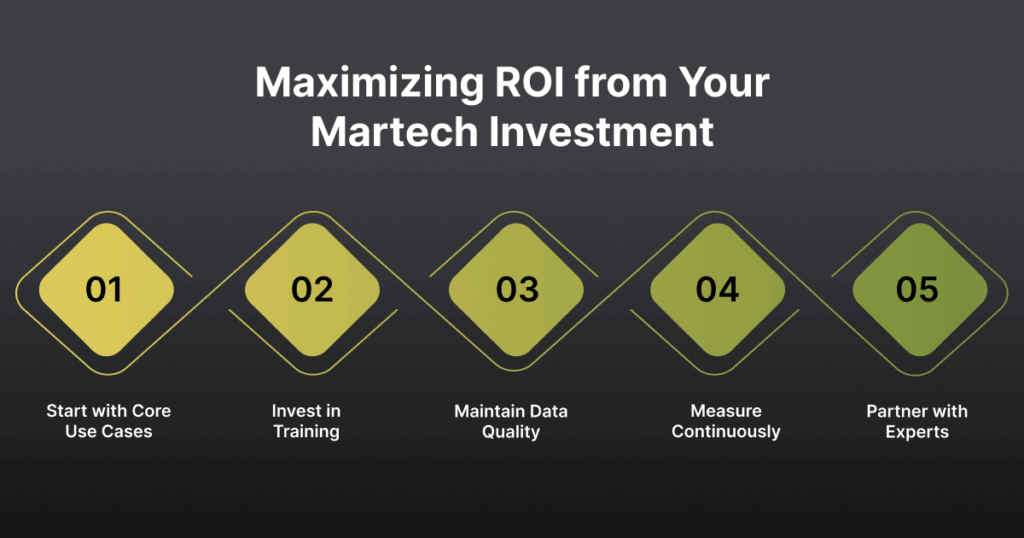
Maximizing ROI from Your Martech Investment
Selecting the right platforms is only half the battle. Here's how to ensure your martech stack delivers measurable results:
Best Practices for Implementation:
1. Start with Core Use Cases
Don't try to implement everything at once. Begin with high-impact use cases that deliver quick wins. Success breeds momentum—prove value before expanding scope.
2. Invest in Training
The shift requires reskilling teams, turning raw data into usable data products, and creating governance frameworks. Your team needs to understand the tools they're using. A powerful platform operated by untrained users delivers zero ROI.
3. Maintain Data Quality
Your customer data platforms (CDP) are only as good as the data they contain. Implement data hygiene practices from day one. Bad data amplified by AI creates bad decisions at scale.
4. Measure Continuously
Track adoption rates, time-to-value, and business impact. Companies using AI in marketing report 22% higher ROI, 47% better click-through rates, and campaigns that launch 75% faster. Establish baselines and measure improvement.
5. Partner with Experts
Consider working with specialized agencies who understand martech stack optimization and can accelerate your time to value. The right partner transforms technology investment into business results.
Conclusion
The marketing technology trends 2026 make it clear that AI powered marketing platforms are driving growth today. Companies that delay adoption risk falling behind data driven competitors.
Brands leveraging AI report 22% higher ROI, 47% better click-through rates, and campaigns that launch 75% faster. The real question isn’t if you should invest in top martech platforms 2026, but how fast you can put them to work.
Whether you’re building or refining your marketing automation platforms, the tools in this guide such as Google Analytics, HubSpot, Salesforce, 6sense, and Segment stand out as the most powerful B2B martech solutions for 2026.
Ready to Transform Your Marketing?
Choosing the right martech platform for 2026 doesn’t have to be a solo journey. Partner with India's first ITSMA-awarded agency. The Smarketers combine deep AI marketing tools expertise with proven strategies that deliver the desired ROI.
Contact Smarketers Today to discover how the right martech stack optimization can accelerate your growth in 2026 and beyond.
Frequently Asked Questions
Q: What is the difference between martech and adtech?
Martech encompasses all technology solutions used to plan, execute, and measure marketing efforts across the entire customer journey, focusing on long-term relationship building. Adtech specifically refers to tools for planning, buying, and managing digital advertising campaigns, typically focused on short-term acquisition.
Q: How much should I budget for martech platforms?
Budget varies by company size and needs, typically ranging from 5-15% of revenue for B2B companies. Consider total cost of ownership including licensing, implementation, training, and ongoing optimization. The best marketing technology tools justify investment through measurable ROI.
Q: Can small businesses compete with enterprise martech stacks?
2026 marks the great democratization of AI marketing, as small businesses now have access to predictive analytics, autonomous advertising, and conversational AI that were previously exclusive to Fortune 500 companies. Platforms like Google Analytics, Mailchimp, and HubSpot's free tier provide enterprise-grade capabilities at accessible price points.
Q: How long does martech implementation typically take?
Implementation timelines vary from 30 days for straightforward platforms like Mailchimp to 6-12 months for complex enterprise solutions like Salesforce. Working with experienced partners can significantly accelerate deployment while ensuring proper configuration for maximum ROI.
Q: What's the most important factor when choosing martech platforms?
Integration capabilities consistently rank as the top consideration. Choose platforms that connect seamlessly with your existing tech stack to avoid data silos and enable martech stack optimization. The best individual tools become ineffective if they can't share data with your broader ecosystem.
Q: How do I measure ROI from martech investments?
Start by establishing baseline metrics before implementation. Track both leading indicators (adoption rates, data quality, workflow efficiency) and lagging indicators (conversion rates, pipeline velocity, customer lifetime value). The most successful implementations show improvement across both categories within 90 days.
Q. Which martech tools offer the best ROI for B2B marketers in 2026?
For enterprises with complex needs, Salesforce delivers exceptional ROI through its unified data model, reducing tech stack complexity while improving personalization accuracy by up to 45%.
Q. What are the emerging martech trends shaping the future of marketing?
The future of marketing is being shaped by five major martech trends redefining how brands engage customers and drive growth:
- Agentic AI: Marketing AI is evolving from reactive assistants to proactive agents that execute tasks, optimize campaigns, and allocate budgets autonomously.
- Privacy-First Personalization: Consumers demand transparency and control; platforms integrating privacy-enhancing technologies (PETs) are setting new ethical standards for personalization.
- Real-Time Predictive Analytics: AI-powered analytics now enable marketers to anticipate customer behaviour and act instantly, making predictive intelligence a core capability.
- Unified Customer Data Platforms (CDPs): CDPs integrate data from multiple channels, creating a single customer view that fuels precision targeting and consistent cross-channel experiences.
- Conversational AI: From chatbots to voice assistants, next-gen conversational AI delivers hyper-personalized, human-like interactions that boost engagement and conversions.
Together, these trends mark a decisive shift toward autonomous, ethical, and intelligence-driven marketing ecosystems.
Key Takeaways
- The marketing technology trends 2026 confirm that AI powered marketing platforms are driving business growth today.
- More than 15000 martech tools exist, but success depends on choosing the right ones for your goals.
- AI native tools dominate 2026, reshaping how marketers plan, execute, and measure campaigns.
- Integration is the single most important factor when building a martech stack.
- Google Analytics, HubSpot, Salesforce, SEMrush, and 6sense lead the 2026 martech ecosystem.
- Businesses using AI report higher ROI, faster campaign delivery, and better personalization.
- Predictive analytics, unified customer data, and conversational AI define the next stage of marketing.
- Martech adoption is no longer optional; delay means falling behind data driven competitors.
- Small and large businesses alike can now access enterprise level tools for scalable growth.
- The future belongs to connected, intelligent, and privacy focused marketing ecosystems.

